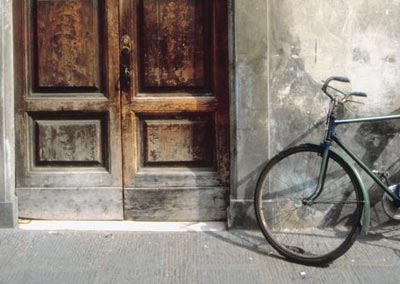(单词翻译:单击)
情景对话
Todd: So, Marion, what countries have you lived in?
托德:玛里昂,你曾在哪些国家生活过?
Marion: I've lived in Italy, France, Australia, and now Japan...and Ireland of course.
玛里昂:我在意大利、法国、澳大利亚生活过,现在我住在日本……当然我也在爱尔兰生活过。
Todd: Wow, you lived in Italy, huh?
托德:哇,你在意大利生活过?
Marion: Yeah.
玛里昂:对。
Todd: Wow. How long did you live in Italy for?
托德:哇,你在意大利生活了多长时间?
Marion: Um, for two separate periods, so a year each so it total about two years. Almost two years.
玛里昂:嗯,那是两段不同的时期,每次大概一年的时间,所以我一共在意大利生活了两年的时间,差不多两年。
Todd: Wow, that's pretty cool. So why did you go to Italy? What were you there for?
托德:哇,那真是太酷了。你为什么会去意大利?你去那里干什么?
Marion: I went there to study Italian. The first time I studied Italian and then French, and then the second time I went back after graduating to study more Italian.
玛里昂:我去那里学习意大利语。第一次我去学了意大利语和法语,我在毕业后第二次前往意大利,更加深入地学习意大利语。
Todd: That's pretty cool.
托德:太酷了。
Marion: Hmm! It was interesting, yeah.
玛里昂:嗯!而且很有意思。
Todd: So were your classes tough? What it a tough study program?
托德:你上的课程难吗?学习课程难吗?
Marion: Hmm, they were very interesting, and the first time I went, my Italian wasn't so good, cause I had only studied for two years before I went the first time, so even though my Italian improved enormously over that first year, in the beginning it was quite difficult, I had one professor for example, who would constantly say to me, in class, in Italian, "Are you following? Are you following?" so it was a bit intimidating.
玛里昂:嗯,其实很有趣,我第一次去的时候,我意大利语说的不太好,因为我在第一次去意大利之前只学了两年的时间,所以虽然我在意大利的那一年我的意大利语水平突飞猛进,但是在我刚去的时候我过得很艰难,举个例子,有个教授在课程上一直用意大利问我:你跟得上的吗?你听的明白吗?那有点儿令人害怕。
Todd: Yeah, I don't think I could do that with my students.
托德:是啊,我想我不会这么对我的学生。
Marion: No, no, it was really awful, he was really singling me out, so all the other people in the class used turn their head around and look at the strange foreigner in their class who maybe or maybe, maybe could understand or maybe didn't, but I just felt very nervous and a bit awkward there because I was just waiting for him to pounce on me, "Mi segue, mi segue!" It's terrible.
玛里昂:不是,情况非常糟糕,他会点名问我,所以班里的其他学生会转过头来看着我——班上这个不知道是否明白的奇怪的外国人,我感到非常紧张,而且有点尴尬,因为我觉得他会冲过来问我“你明白吗,你跟得上吗?那太糟糕了。
Todd: "Mi segue" is "are you following?"
托德:Mi segue就是你跟得上的意思吗?
Marion: Are you following me, literally, yeah, basically do you understand.
玛里昂:对,字面上来说,就是问你明白吗?
Todd: Ah, OK. Um, what was life like in Italy, at university. How was it different than say, univeristy in Ireland?
托德:好。嗯,意大利大学怎么样?意大利的大学与爱尔兰的大学有什么不同?
Marion: Well, my university is one one big campus, I think that's maybe the way in America as well. In Italy though, the buildings of the university are spread all over the city, so you'll have for example, the language and literature faculty, where I was, in one part of the town, and then maybe 10 or 20 minutes away by bus you might have the faculty of education where I had to go to some lecturers as well so that was very different, for me to have everything so spread out. Also, the buidlings were so old, you know in Italy there are really old traditional buildings, so they are beautiful, really beautiful, you walk into the faculty building, and there's a huge courtyard, and beautiful architecture, all around you. It's absolutely amazing. You felt like you were a little part of history, inside you know, so yeah, that was amazing.
玛里昂:我在爱尔兰的大学是一个大校园,我想美国的大学也一样。可是意大利大学的教学楼分布在整个城市,举个例子,语言和文学学院的教学楼可能在城市的这个部分,而教育学部的距离可能有10或20分钟的公交车程,我有一些课程要在教育学部上,对我来说相隔这么远的教学楼是种不同的体验。而且意大利大学的教学楼非常古老,意大利有传统又古老的大楼,那些大楼非常漂亮,走进教学楼会看见一个巨大的庭院,在你身边都是漂亮的建筑。这简直太令人惊奇了。你会感觉你是历史的一部分,非常神奇。
Todd: Well, sounds cool.
托德:嗯,听起来很棒。
Marion: Yeah, it was great, one of the best years of my life.
玛里昂:对,非常不错,那是我一生中最棒的几年。

译文属可可原创,仅供学习交流使用,未经许可请勿转载
重点讲解
重点讲解:
1. single out
单独挑出;特别选出;
eg. His immediate superior has singled him out for a special mention.
他的顶头上司特别提到了他。
eg. It would be invidious to single out any one person to thank.
单独感谢任何一个人都易引起反感。
2. turn around
转动;转身;扭转;
eg. I felt a tapping on my shoulder and I turned around.
我感到有人拍了一下我的肩膀,于是转过身去。
eg. He turned around as he heard a noise behind him.
他听到身后有响声,便转过身来。
3. pounce on
(人)猛扑,突袭;
eg. He pounced on the photographer, beat him up and smashed his camera.
他突然扑向摄影师,痛打了他一顿,还摔碎了他的照相机。
eg. Fraud squad officers had bugged the phone and were ready to pounce.
反诈骗小组的警员们已在电话上安装了窃听器,并随时准备突击。
4. spread out
相隔很远的;分散的;
eg. The Kurds are spread out across five nations.
库尔德人散居在 5 个国家中。
eg. The search party spread out over the moor.
搜索队在荒草地分散行动。


